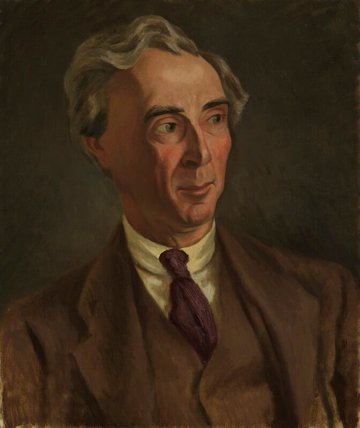
Bertrand Russell
‐
Philosopher, writer, social reformer and Chairman of the India League
Other names
Bertrand Arthur William Russell
Place of birth
Place of death
Plas Penrhyn, Penrhyndeudraeth, Gwynedd
About
Bertrand Russell was a philosopher, journalist and political campaigner. From 1890 to 1893 Russell studied mathematics at Trinity College, Cambridge. In 1914 he took up a visiting lectureship at Harvard University, where he befriended T. S. Eliot. Russell’s opposition to Britain’s participation in the First World War played a key role in his politicization. Russell supported the No-Conscription Fellowship, which led to his sacking from his lectureship at Cambridge.
In 1932 he became Chairman of the India League, presiding over meetings and regularly chairing India League events. He was heading the organization at the time of the India League’s delegation to India in the autumn of 1932. He wrote the introduction to the delegation’s report published under the title The Condition of India. By 1938 Russell had moved away from political activism and back to philosophy and academic life, accepting a temporary lectureship in Chicago in 1938 and moving to the University of California in 1939. He remained in the United States for most of the Second World War. He returned to Britain in 1944 to take up a five-year fellowship at Trinity College, Cambridge. He was awarded the Nobel Prize in 1950. In 1958 he became one of the founders of the Campaign for Nuclear Disarmament. He died in 1970.
Horace Alexander, C. F. Andrews, H. N. Brailsford, Reginald Bridgeman, Fenner Brockway, Rajani Palme Dutt, Richard A. Harman, Agatha Harrison, G. Hicks, H. F. Horrabin, Atma S. Kamlani, Fred Landon, George Lansbury, Freda Laski, Harold Laski, D. H. Lawrence, James Marley, Leonard Matters, Krishna Menon, Syed Mohamedi, Mrs Brij Lal Nehru, S. L. Polak, A. A. Purcell, S. Radhakrishnan, Shapurji Saklatvala, Krishnarao Shelvankar, Wilfred Wellock, Monica Whately, Tom Williams (MP), Ellen Wilkinson (MP).
German Social Democracy (London: Longmans, Green & Co., 1896)
An Essay on the Foundations of Geometry (Cambridge: Cambridge University Press, 1897)
The Principles of Mathematics (Cambridge: Cambridge University Press, 1903)
Philosophical Essays (London: Longmans, Green & Co., 1910)
(with Alfred North Whitehead) Principia Mathematica, 3 vols (Cambridge: Cambridge University Press, 1910–13)
The Problems of Philosophy (London: Williams & Norgate, 1912)
Principles of Social Reconstruction (London: Allen & Unwin, 1916)
Justice in War-Time (Chicago: Open Court, 1916)
Political Ideals (New York: The Century Co., 1917)
Mysticism and Logic and Other Essays (London: Allen & Unwin, 1917)
Proposed Roads to Freedom: Socialism, Anarchism, and Syndicalism (New York: Holt, 1919)
Introduction to Mathematical Philosophy (London: Allen & Unwin, 1919)
The Practice and Theory of Bolshevism (London: Allen & Unwin, 1920)
The Analysis of Mind (London: Allen & Unwin, 1921)
The Problem of China (London: Allen & Unwin, 1921)
(with Dora Russell) The Prospects of Industrial Civilization (London: Allen & Unwin, 1923)
The ABC of Relativity (London: Kegan Paul, Trench, Trubner, 1925)
What I Believe (London: Kegan Paul, Trench, Trubner, 1925)
On Education, Especially in Early Childhood (London: Allen & Unwin, 1926)
The Analysis of Matter (London: Kegan Paul, Trench, Trubner, 1927)
An Outline of Philosophy (London: Allen & Unwin, 1927)
Why I Am Not a Christian (London: Watts, 1927)
Sceptical Essays (London: Allen & Unwin, 1928)
Marriage and Morals (London: Allen & Unwin, 1929)
The Conquest of Happiness (London: Allen & Unwin, 1930)
The Scientific Outlook (London: Allen & Unwin, 1931)
Education and the Social Order (London: Allen & Unwin, 1932)
Freedom and Organization, 1814–1914 (London: Allen & Unwin, 1934)
In Praise of Idleness (London: Allen & Unwin, 1935)
Religion and Science (London: Thornton Butterworth, 1935)
Which Way to Peace? (London: Jonathan Cape, 1936)
(with Patricia Russell) The Amberley Papers: The Letters and Diaries of Lord and Lady Amberley, 2 vols (London: Hogarth Press, 1937)
Power: A New Social Analysis (London: Allen & Unwin, 1938)
Human Knowledge: Its Scope and Limits (London: Allen & Unwin, 1948)
Authority and the Individual (London: Allen & Unwin, 1949)
Unpopular Essays (London: Allen & Unwin, 1950)
New Hopes for a Changing World (London: Allen & Unwin, 1951)
The Impact of Science on Society (London: Allen & Unwin, 1952)
Satan in the Suburbs and Other Stories (London: Allen & Unwin, 1953)
Human Society in Ethics and Politics (London: Allen & Unwin, 1954)
Nightmares of Eminent Persons and Other Stories (London: Allen & Unwin, 1954)
Portraits from Memory and Other Essays (London: Allen & Unwin, 1956)
Logic and Knowledge: Essays 1901–1950, ed. by Robert C. Marsh (London: Allen & Unwin, 1956)
Why I Am Not A Christian and Other Essays on Religion and Related Subjects, ed. by Paul Edwards (London: Allen & Unwin, 1957)
Common Sense and Nuclear Warfare (London: Allen & Unwin, 1959)
My Philosophical Development (London: Allen & Unwin, 1959)
Wisdom of the West, ed. by Paul Foulkes (London: Macdonald, 1959)
Fact and Fiction (London: Allen & Unwin, 1961)
Has Man a Future? (London: Allen & Unwin, 1961)
Unarmed Victory (London: Allen & Unwin, 1963)
War Crimes in Vietnam (London: Allen & Unwin, 1967)
The Autobiography of Bertrand Russell, 3 vols (London: Allen & Unwin, 1967–9)
Dear Bertrand Russell...A Selection of his Correspondence with the General Public 1950–1968, ed. by Barry Feinberg and Ronald Kasrils (London: Allen & Unwin, 1969)
L/PJ/12/448, India Office Records, Asian and African Studies Reading Room, British Library, St Pancras
L/PJ/12/356, India Office Records, Asian and African Studies Reading Room, British Library, St Pancras
Correspondence with the Society of Authors, British Library, St Pancras
Correspondence with Rajani Palme Dutt, Labour History Archive and Study Centre, Manchester
Image credit
Bertrand Russell by Roger Fry, oil on canvas, circa 1923, NPG 4832
© National Portrait Gallery, London, http://creativecommons.org/licenses/by-nc-nd/3.0/
